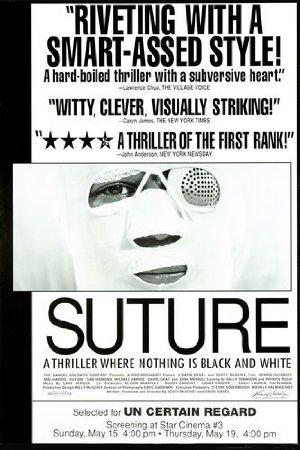 An interesting but overly affected psycho thriller from the nineties. SUTURE has a definite charm, though it’s all-but buried under a veritable avalanche of arty pretension.
An interesting but overly affected psycho thriller from the nineties. SUTURE has a definite charm, though it’s all-but buried under a veritable avalanche of arty pretension.
The low budget SUTURE (1993) was the debut feature of Scott McGhee and David Siegel (who went on to make the thriller DEEP END and the drama BEE SEASON). It was constructed around a casting gimmick that had a black guy (a pre-24 Denis Haysbert) playing the “twin” brother of a white guy (Michael Harris), which may or may not have been intended as some kind of Rodney King-tinged racial commentary. The film was executive produced by Steven Soderbergh and featured established actors like THIRTYSOMETHING’S Mel Harris, POLICE ACADMEY’S David Graf and the veteran Dina Merrill. Not that they make much difference to what is ultimately a glorified student film.
Clay and Vincent are estranged twin brothers who apparently look totally alike–never mind that the former is a husky black man and the latter a skinny white dude! They meet for the first time at the Phoenix airport to attend their father’s funeral. Clay has been invited by Vincent to stay at his gaudy art deco pad, unaware that Vincent plans to kill him. Vincent, you see, just killed their father and has decided to switch identities with Clay so the latter will take the blame. Vincent puts his dastardly plan into motion by blowing up a car Clay is driving and then skipping town, his new identity apparently intact.
But Clay survives the explosion. He awakens in a hospital bed with total amnesia. A comely nurse helps him recuperate and inevitably becomes romantically involved with “Vincent.” But he suffers from disquieting dreams and hallucinations. He also has to contend with police suspicion that he killed his father, as well as a growing sense of paranoia. He’s right to feel that way, as Vincent is back in town and determined to finish off his supposed-to-be-dead twin!
What gives this film its distinction is the conceit of having none of its characters notice that the lead actors are far from the identical twins they purport to be. This can be taken as a cunning surrealist ploy or student film posturing. I’ll have to go with the latter view.
The only point where the idea really works occurs in the final scene, a photo montage of the male and female leads in smiley poses while stony narration informs us they’re living a sham. It’s both a subversive twist on traditional happy endings and an adroit summation of what seems to be the overriding theme, that the key to contentment lies in one’s sense of identity, without which one can never be truly whole. Perhaps this was what was intended by the racially-charged casting: no matter how hard the African American Clay tries to settle into his new identity as the Caucasian Vincent, we’re always made visually aware that he’ll never completely attain that goal.
This doesn’t change the fact that SUTURE is dumb and overwrought. The black and white photography is interesting but the proceedings are filled with distracting editing room howlers (i.e. a cut from an opened door to another door opening miles away) and silly dialogue. The narrative is staid and uneventful (flashbacks and dream sequences can only take a movie so far) and the film overflows with the type of “hommages” you’d expect from first time filmmakers—if you’ve seen the Japanese FACE OF ANOTHER or John Frankenheimer’s SECONDS you’ll recognize strong echoes of both.
Vital Statistics
SUTURE
The Samuel Goldwyn Company
Directors/Producers/Screenwriters: Scott McGhee, David Siegel
Cinematography: Greg Gardner
Editing: Lauren Zuckerman
Cast: Denis Haysbert, Mel Harris, Sab Shimono, Michael Harris, David Graf, Dina Merrill, Fran Ryan, John Ingle, Sandy Gibbons, Mark DeMichele
